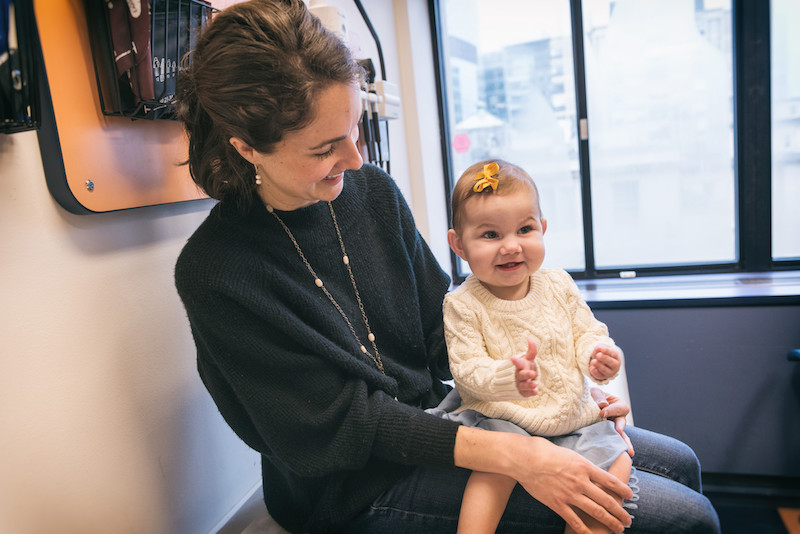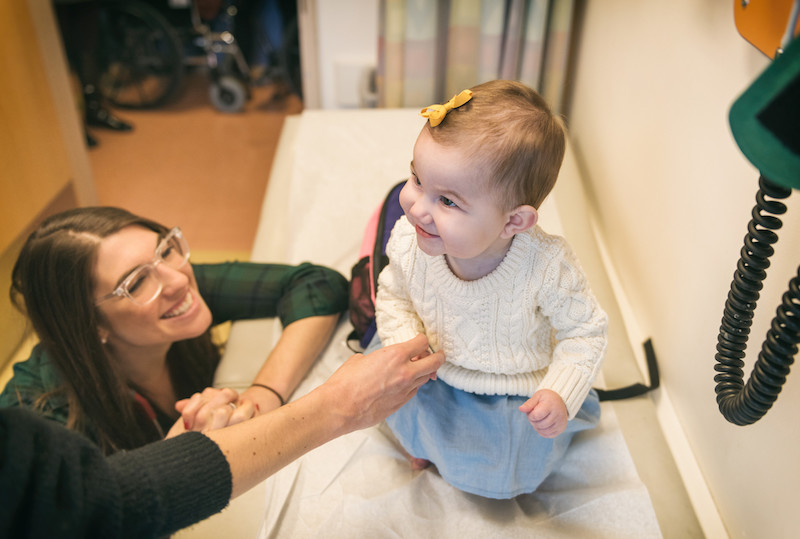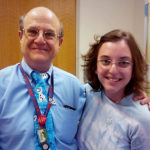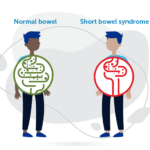Worth the fight: Finding care for short bowel syndrome

When Hannah Lillie meets someone new, she’s likely to smile and blow them a big kiss. The friendly, wide-eyed toddler loves being the center of attention — but when she was just 3 weeks old, she and her parents, Layne and Ryan, found themselves in the middle of a medical whirlwind they could never have expected. When she suddenly began vomiting and turning blue during a routine feeding, her parents rushed to their local emergency department.
There, they learned that she was experiencing volvulus, a life-threatening problem that occurs when the intestine twists on itself, cutting off its blood supply and causing the intestinal tissue to die. After being transported from their small Florida beach town to a larger hospital in Pensacola, Hannah underwent emergency surgery — but not before clinicians ushered her parents into the intensive care unit. “They wanted us to be there to say goodbye in case she died,” remembers Ryan.

An uncertain future
Thankfully, the surgery was a success. But it was just the beginning of the Lillies’ journey. The procedure had left their daughter with just 3 centimeters of small intestine. This condition, known as short bowel syndrome, makes it difficult for the body to absorb the nutrients necessary to grow and thrive.
“At first, we felt like we had been painted into a corner with the surgery,” says Ryan. “We knew it had saved Hannah’s life, but we didn’t know what kind of life that would be. We thought our only options were to keep her on total parenteral nutrition, pursue an intestinal transplant or consider hospice care.”

‘Like I could finally breathe’
That view of the future changed as the Lillies began researching their daughter’s condition. Their search brought them to this blog, where they read about other children with short bowel syndrome who are now thriving. A call with Dr. Mark Puder in the Center for Advanced Intestinal Rehabilitation (CAIR) at Boston Children’s Hospital gave them further hope. “He reassured us that the quality of life for these kids is generally good now,” says Layne. “We decided we would try to work with the intestines that Hannah had left.”
Layne and Ryan credit their ability to travel to Boston for care to their families, their strong community and Angel MedFlights, which provided affordable transportation for Hannah. When asked whether they found their two-month stay at Boston Children’s overwhelming, Layne doesn’t hesitate. “The fact that Hannah was even alive was a miracle, so being away from home didn’t seem like a big deal,” she says. “When we arrived in Boston, I felt like I could finally breathe — I knew Hannah was in the best place in the entire world for care.”

One day at a time
These days, the Lillies return to Boston every eight weeks, where Hannah sees Dr. Puder, Dr. Alexandra Carey, dietitian Megan Gray, nurse practitioner Elizabeth Castle and other members of the CAIR team. She’s gained weight, and now only requires 12 hours of intravenous feeding a day. “She’s actually ahead with her developmental milestones — she’s right where her clinicians want her to be,” says Layne. Indeed, Hannah is busy walking, hanging out with her four-weeks-younger cousin and playing with her canine “brother,” Hank.
“Our faith played a huge role in helping us get to this point,” says Ryan. “If you look at the whole picture, it can feel like it’s too much to bear, so we try to take things one day at a time and trust in God’s plan.”
Layne agrees. “I tell other parents that coping with a chronic illness can be a really hard road, but that you and your child are stronger than you think,” she says. “It does get better — and it’s so worth the fight.”
Learn about the Center for Advanced Intestinal Rehabilitation.
Related Posts :
-

Studies pinpoint risk factors for complications of pediatric intestinal failure
Pediatric intestinal failure occurs when patients lack the amount of intestine necessary for growth and development. As advances in treatment ...
-

Finding specialized care for short bowel syndrome: Meet Makai
Eric Maldonado was picking up some groceries one day last fall when he saw a familiar face: The woman, a ...
-

‘Never stop looking for answers’: Andrea’s journey with dysmotility
As a volunteer at Caritas Internationalis, Andrea Hernandez loves helping feed the hungry. Yet, until recently, Andrea herself was unable ...
-

A taste of childhood: One family’s journey to an IV-free diet
Children with short bowel syndrome often miss out on childhood’s simple and delicious pleasures, like birthday cake, ...





